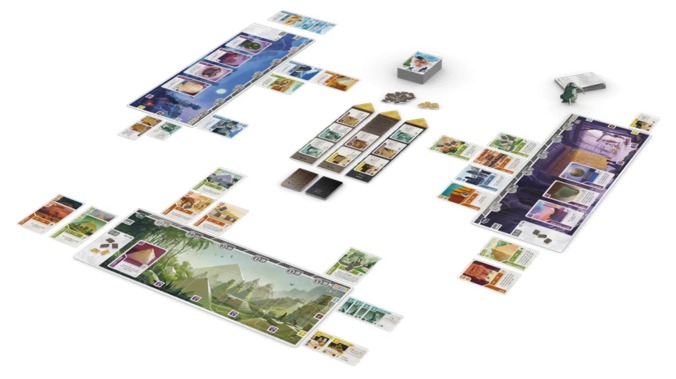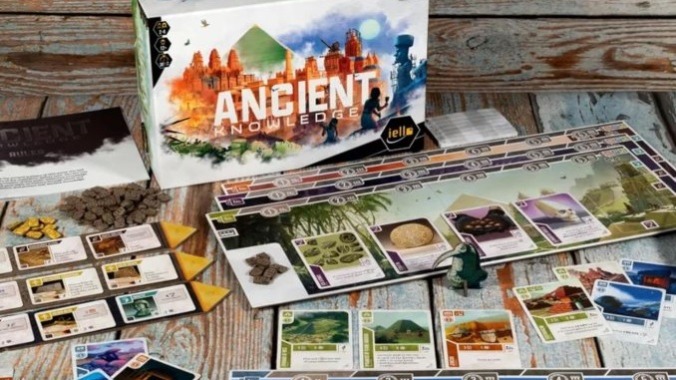The actual game inside of Ancient Knowledge is quite good, a medium-weight game that has some engine-building elements and requires a lot of strategy in how you manage your hand cards. The title and the theme don’t really do it justice, unfortunately, and that might lead people to overlook it—it’s allegedly about acquiring knowledge that eventually fades over time, but I’ve found I enjoy the game without paying much if any attention to the titles or themes of the individual cards.
Ancient Knowledge is primarily a game of cards, and of hand management, with all of the cards you draw either monuments or artifacts. Monument cards go into the 12 slots, two per column, above your player board, while artifacts go into any of the five slots directly on the board. Each monument card shows three values on it—the slot into which you may place it for free, the number of knowledge tokens you put on the card when you play it, and its victory point value. Some cards require that you pay extra cards just to place it in its designated column. If you want to place a card into another slot instead, you must discard one card for each column away from the default one, although some cards are “locked” and can’t be placed elsewhere. Monument cards usually have text on them that makes something happen, when played, when they go to the past, or at end-game. fs
After every turn, you will move everything in your queue one slot to the left. Eventually, cards reach the last spot and go into the past, at which point two main things happen: Any remaining knowledge tokens move to your player board, from where it’s harder to remove them; and the card becomes available for the excavate action. Normally you can ‘search’ and take one card, but once you have cards in your past, you can ‘excavate’ as many of them as you’d like and draw two cards for each. Once excavated, they’re turned 90 degrees and can’t be re-excavated (is that a word?) until you take an action to straighten them again. Many monument cards also have a power that becomes active when they go into your past. Artifact cards have ongoing powers, most of which are pretty useful, and you can have up to five of them active at any time. They’re not worth any points at game-end, and often discarding them brings other benefits.

You can also ‘learn’ a technology card if you fulfill its requirements; there are up to nine visible at any time for any player to claim, with two levels and three categories and a bunch of possibilities I won’t go into here beyond saying that most of them are good and it’s always worth checking to see if you can take one before making a move.
The game ends when any player has 14 or more cards in their past, after which you go around until every player has played the same number of turns. You gain points shown on all cards in your past, bonus points from technology cards and from monument cards that award you variable points, and one more point for every monument card left in your timeline, then subtract one point for every knowledge token remaining on your board.
Ancient Knowledge does break one of my heuristics for evaluating games—its rules are more complex to explain than the game itself is when played—but I like it anyway, because the rules end up making quite a bit of sense once you’ve played a few turns, and there’s nothing extraneous about them. You can summarize the rules pretty easily, and then talk players through the individual cards, since the heart of the game is in the text on the cards, along with a number of icons to learn. You get two actions per turn: playing a card, drawing a card, excavating, learning a technology, or discarding X cards to remove X tokens from cards in your timeline. You can take the same action twice. Those are the core mechanics in a nutshell, and the devil is in the cards’ details.
I don’t dislike the theme, it’s just not integrated with game play at all. I play this online on Board Game Arena and find I have zero idea what the names of the cards I’ve played are. I understand the idea of knowledge becoming lost to the past, and thus requiring excavation to rediscover it—I’m good friends with an archeologist, so I’d better say I get this—and the names of the cards are rooted in cultures from around the world, but I couldn’t connect them to the mechanics of the cards in any meaningful way. That’s not a hindrance to playing it, but I do appreciate games where the play and the theme work together.
Ancient Knowledge is a midweight game in actual gameplay, but I would say it requires as much reading comprehension as many heavy games do, so it’s not one for the younger set. With playing times around an hour, though, it’s a good game for a group that blends fans of crunchier games with folks who like medium-weight titles or who roll their eyes at a two-hour session. I’d probably like it a little more with a different theme, and it deserves a catchier title, but there’s a strong game here underneath the superficial stuff.
Keith Law is the author of The Inside Game and Smart Baseball and a senior baseball writer for The Athletic. You can find his personal blog the dish, covering games, literature, and more, at meadowparty.com/blog.

